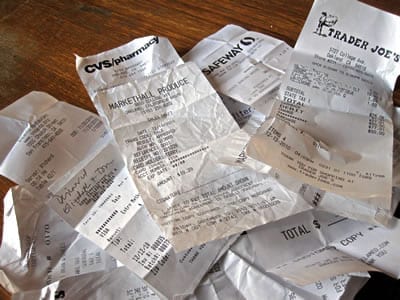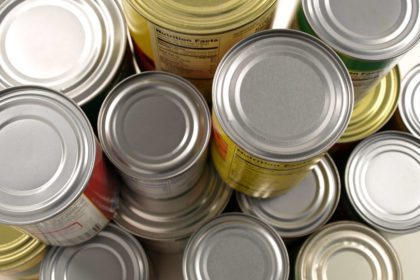
It’s getting to be that time again…April 15th is just two months away! If you’re busy gathering up a year’s worth of your receipts, you might want to consider using some gloves during the process.
A study by the Environmental Working Group revealed that BPA (bisphenol-A) is not just showing up in plastic bottles and food cans, but in many cash register receipts printed on BPA-coated thermal paper. BPA is a synthetic estrogen with strong evidence that it causes reproductive abnormalities, gene alterations and cancer. According to the EWG, the amount of BPA is 250 to 1,000 times higher on one of these receipts than the amount in a typical food can.

Thermal paper receipts tested included those from major retailers (e.g., CVS, Walmart), fast-food restaurants (e.g., McDonald’s, KFC), grocery stores (e.g., Whole Foods, Safeway), convenience stores, ATM machines, post offices, and gas stations. Target, Starbucks and Bank of America ATM are using alternatives for printing receipts as their samples were found to be BPA-free or contain only nominal amounts. (See test results.) In addition to receipts, thermal paper is also used on prescription labels, lottery tickets and airline tickets.
BPA can be ingested if it touches your mouth and also stick to your skin where it can be absorbed directly into your bloodstream. A Swiss study reveals the compound can penetrate deep within the skin layers. Until all retailers start printing BPA-free receipts, be sure to clean your hands immediately with soap and water – not hand sanitizer. Better yet, wear protective gloves whenever possible when handling receipts.
Tips to reduce exposures to BPA in receipts (from the Environmental Working Group):
- Minimize receipt collection by declining receipts at gas pumps, ATMs and other machines when possible.
- Store receipts separately in an envelope in a wallet or purse.
- Never give a child a receipt to hold or play with.
- After handling a receipt, wash hands before preparing and eating food (a universally recommended practice even for those who have not handled receipts).
- Do not use alcohol-based hand cleaners after handling receipts. A recent study showed that these products can increase the skin’s BPA absorption (Biedermann 2010).
- Take advantage of store services that email or archive paperless purchase records.
- Do not recycle receipts and other thermal paper. BPA residues from receipts will contaminate recycled paper.
- If you are unsure, check whether paper is thermally treated by rubbing it with a coin. Thermal paper discolors with the friction; conventional paper does not.





